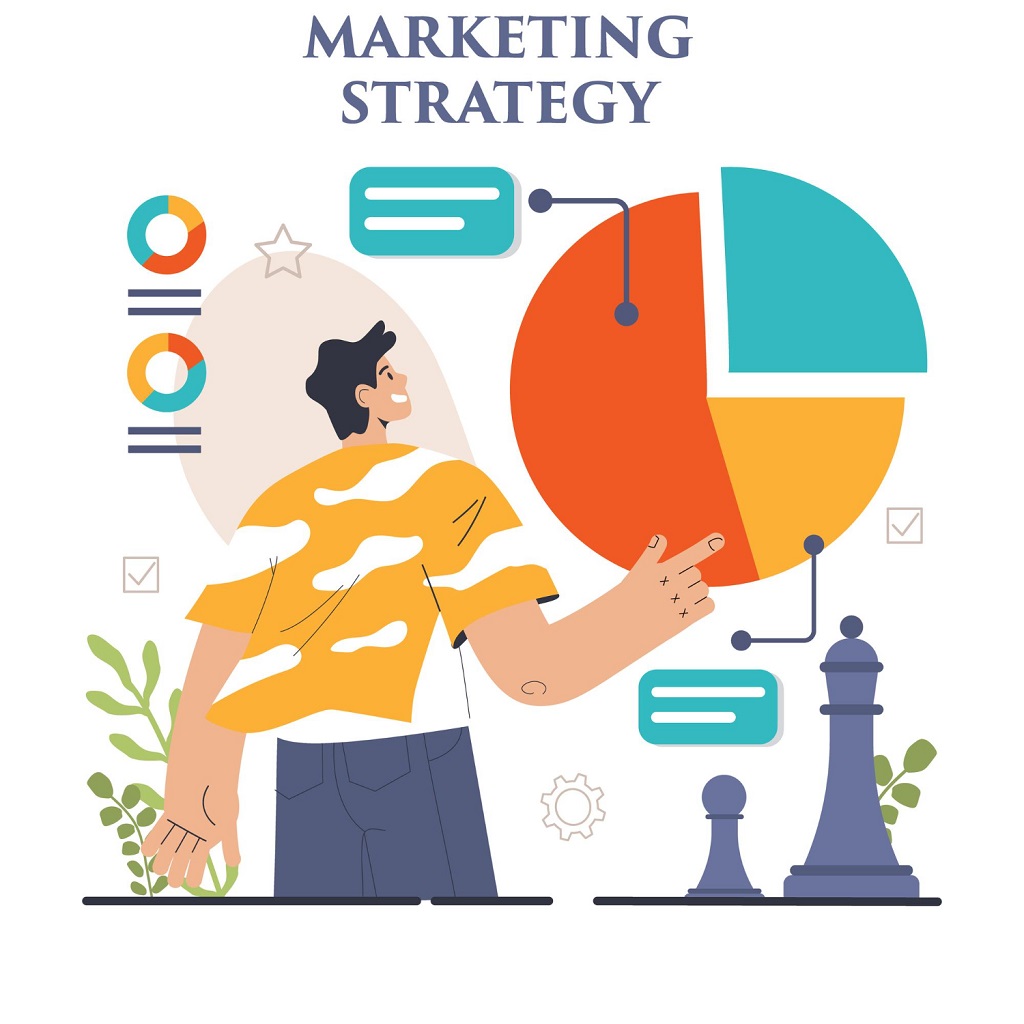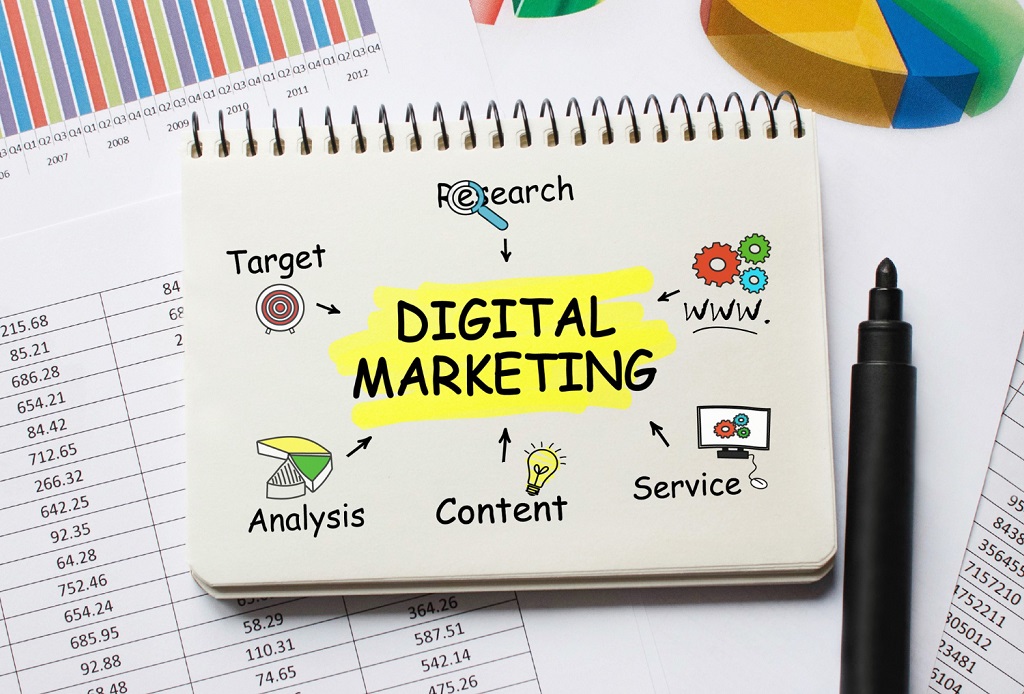A digital marketing strategy refers to the comprehensive plan and approach adopted by businesses to promote their products or services using various digital channels and platforms. It involves leveraging online tools and technologies to reach and engage with the target audience, increase brand visibility, and drive conversions. A well-crafted digital marketing strategy encompasses a range of activities, such as search engine optimization (SEO), content marketing, social media marketing, email marketing, and paid advertising. The primary goal of a digital marketing strategy is to create a strong online presence and establish meaningful connections with potential customers. By understanding consumer behavior, market trends, and competitors, businesses can tailor their digital marketing efforts to maximize reach and impact. This involves identifying the most suitable platforms and channels to target specific audience segments, crafting compelling and relevant content, and analyzing data to optimize campaigns. A successful digital marketing strategy not only helps in attracting new customers but also fosters customer loyalty and encourages repeat purchases. It is an essential tool for businesses in today’s digital age, where consumers increasingly rely on the internet and online platforms to discover, research, and purchase products and services. Moreover, a digital marketing strategy allows businesses to measure and track the effectiveness of their marketing initiatives, enabling them to make data-driven decisions and continually improve their efforts. Overall, a comprehensive and well-executed digital marketing strategy is crucial for businesses to thrive in the digital landscape and stay ahead of the competition.

Digital marketing strategy vs. campaign vs. tactics
Digital marketing strategy refers to the overall plan and approach used by businesses to promote their products or services online. It involves a systematic and comprehensive approach to achieve specific marketing objectives. On the other hand, a digital marketing campaign is a specific and time-bound initiative within the broader strategy. It focuses on a particular goal or objective and utilizes various tactics to achieve it. These tactics are the specific actions and activities employed to execute the campaign and reach the target audience. While the strategy provides the overarching direction, campaigns and tactics are the means through which businesses execute their digital marketing efforts.
A well-defined digital marketing strategy is essential for businesses to effectively compete in the digital landscape. It helps businesses identify their target audience, define their unique selling proposition, and determine the most appropriate channels and platforms to reach their target market. A strategy outlines the key messaging and positioning to create a consistent brand image across different digital channels. It also sets measurable goals and objectives that can be tracked and evaluated to ensure the effectiveness of the marketing efforts.
Once the strategy is in place, businesses can develop digital marketing campaigns to achieve specific objectives. These campaigns are focused initiatives that are designed to create awareness, generate leads, drive conversions, or achieve other predetermined goals. For example, a business may launch a campaign to increase website traffic by utilizing search engine optimization (SEO) techniques, pay-per-click (PPC) advertising, or social media marketing. Each campaign has its own timeline, budget, and set of activities that are aligned with the overall strategy.
Within a digital marketing campaign, businesses employ various tactics to execute the planned activities and achieve the desired outcomes. These tactics can include content creation, email marketing, social media management, influencer partnerships, and many others. For instance, in a content marketing tactic, businesses may create and distribute blog posts, videos, infographics, or eBooks to engage their target audience and provide valuable information related to their products or services. Similarly, in an email marketing tactic, businesses send targeted emails to prospects or customers to nurture relationships and drive conversions.
It is important for businesses to understand the difference between their overall digital marketing strategy, the campaigns they undertake, and the specific tactics employed within those campaigns. A strong strategy sets the foundation for successful campaigns, and effective tactics are the tools used to execute the planned activities. By aligning these elements, businesses can optimize their digital marketing efforts and achieve their marketing objectives.
In conclusion, digital marketing strategy, campaigns, and tactics are interconnected components that work together to achieve marketing goals. A robust strategy provides a framework for businesses to plan and execute campaigns, while tactics are the specific actions taken within those campaigns. By understanding the distinctions between these elements, businesses can develop comprehensive and effective digital marketing plans that drive results in the online landscape.
Components of digital marketing strategies
Digital marketing strategies consist of several key components that are essential for businesses to effectively reach and engage with their target audience in the digital realm. One of the fundamental components is search engine optimization (SEO), which involves optimizing a website’s content and structure to improve its visibility and ranking on search engine results pages. Another vital component is social media marketing, which leverages various social media platforms to promote products or services, build brand awareness, and interact with customers. Content marketing is also a crucial element, as it involves creating and distributing valuable and relevant content to attract and retain a clearly defined audience. Email marketing is another component that enables businesses to communicate directly with their customers through personalized and targeted email campaigns. Additionally, paid advertising, such as pay-per-click (PPC) advertising and display advertising, allows businesses to promote their offerings through targeted ads on search engines and other websites. Furthermore, influencer marketing has emerged as a popular component in recent years, as businesses collaborate with influential individuals or celebrities to promote their products or services to their loyal followers. Finally, data analytics and tracking play a crucial role in digital marketing strategies, as they provide valuable insights into consumer behavior, campaign performance, and ROI, allowing businesses to make data-driven decisions and optimize their strategies for better results. Overall, these components work together to create a comprehensive and effective digital marketing strategy that helps businesses achieve their marketing goals in the digital age.

Create your digital marketing strategy
When developing a comprehensive digital marketing strategy, it is crucial to consider various aspects that can contribute to the success of a brand’s online presence. The first step is to identify the target audience and understand their needs and preferences. By conducting thorough market research and analyzing consumer behavior, businesses can gain valuable insights to shape their marketing efforts. The next step is to establish clear and measurable goals that align with the organization’s overall objectives. These goals could include increasing brand awareness, driving website traffic, or boosting online sales. Once the goals are defined, it is essential to select the most appropriate digital marketing channels to reach the target audience effectively. This may include social media platforms, search engine optimization (SEO), email marketing, or content marketing. Each channel should be optimized to maximize reach and engagement, ensuring that the right message reaches the right people at the right time. Additionally, creating compelling and relevant content is key to capturing the attention of online users. This content can take various forms, such as blog posts, videos, infographics, or podcasts, and should be tailored to the preferences of the target audience. By consistently providing valuable and engaging content, businesses can establish themselves as thought leaders and build trust with their audience. Furthermore, leveraging data and analytics can provide valuable insights into the effectiveness of the digital marketing strategy. By tracking key metrics such as website traffic, conversion rates, and engagement levels, businesses can make data-driven decisions to optimize their marketing efforts. This could involve adjusting the targeting parameters, refining the messaging, or reallocating resources to the most successful channels. Finally, digital marketing strategies should be adaptable and flexible, taking into account the ever-evolving nature of the online landscape. Regularly reviewing and updating the strategy can help businesses stay ahead of the competition and adapt to emerging trends and technologies. In conclusion, developing a digital marketing strategy requires careful planning and consideration. By understanding the target audience, setting clear goals, selecting appropriate channels, creating compelling content, leveraging data, and staying adaptable, businesses can enhance their online presence and drive meaningful results.